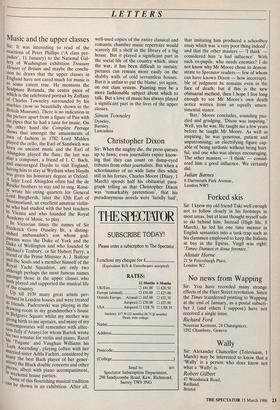Christopher Dixon
Sir: When the mighty die, the press queues up to fawn; even journalists expire know- ing that they can count on damp-eyed tributes from other journalists. But when a schoolmaster of no wide fame dies while still in his forties, Charles Moore (Diary, 1 March) spends half his obituarial para- graph telling us that Christopher Dixon was 'remarkably pretentious', that his pseudonymous novels were 'luridly bad', that imitating him produced a schoolboy essay which was `a very poor thing indeed', and that the other masters — 'I think' — considered him 'a bad influence'. With such ex-pupils, who needs enemies? I do not know why Mr Moore chose to demon- strate to Spectator readers — few of whom can have known Dixon — how incorrupti- ble of judgment he remains even in the face of death; but if this is the new obituarial method, then I hope I live long enough to see Mr Moore's own death notice written from an equally unsen- timental stance.
'But,' Moore concludes, sounding puz- zled and grudging, 'Dixon was inspiring.' Well, yes he was. He taught me a few years before he taught Mr Moore. As well as inspiring, he was generous, patient and unpatronising; an electrifying figure cap- able of being sardonic without being hurt- ful, and one who was always encouraging. The other masters — 'I think' — consid- ered him a good influence. We certainly did.
Julian Barnes
8 Dartmouth Park Avenue, London NW5


















































 Previous page
Previous page